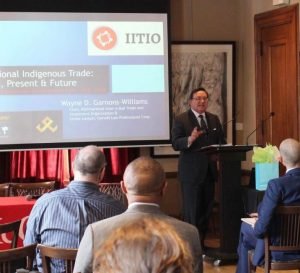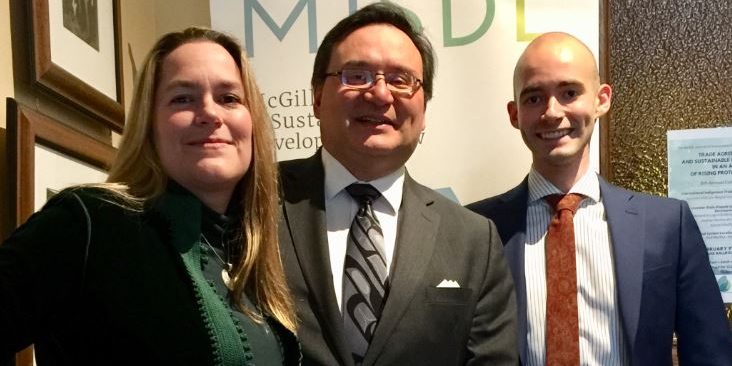
February 9, 2018 – Wayne Garnons-Williams, IITIO Chair, giving the Keynote Address for Faculty of Law, McGill University – 5th Annual McGill Journal of Sustainable Development Law Symposium – “Trade Agreements and Sustainable Development in an Age of Rising Protection”
By Michelle Lara, Associate Editor, McGill Journal of Sustainable Development Law
On Friday February 9th, the McGill Journal of Sustainable Development Law (MJSDL) welcomed speakers and guests to its 5th annual colloquium, “Trade Agreements and Sustainable Development in an Age of Rising Protectionism.” The event marked an extension of this year’s theme for the Journal: the nexus between international trade law and sustainability.
Richard Janda, Associate Professor and Faculty Advisor for the Journal, provided introductory comments to contextualise the day’s discussions. He began with a criticism of the “striking” disparity between the massive institutional resources devoted to the commercial sector and the relatively meager resources allotted to social and environmental concerns. While he acknowledged a general decline in the commitment to the trade agenda, he highlighted the potential for trade law to strengthen relationships between nations and advance global initiatives relating to social and environmental challenges.
The morning panel, “The Implications of Investor-State Arbitration on Sustainable Development,” was composed of Fasken Martineau’s Alexandra Logvin and Alexandre Toso, Hadrian Mertins-Kirkwood of the Canadian Centre for Policy Alternatives, and Karine Péloffy of the Centre québécois du droit de l’environnement. The dialogue centered around investor-state dispute settlement (ISDS), with the majority of the panel underscoring the potential for this regime to be abused by investors and corporate actors. ISDS allows foreign investors to bring claims for damages for violations of trade agreements directly to states, and poses significant challenges to sustainable development, environmental protection, and resource management. Indeed, Mertins-Kirkwood remarked that resource and energy firms disproportionately exploit ISDS to bring suits in these particular domains. Furthermore, he outlined the way in which ISDS enables foreign investors to bypass domestic legal systems in their favour, and can effectively expose governments to the risk of paying potentially unlimited sums in damages. Péloffy echoed this sentiment by describing the dangerous way in which resource extraction companies—such as Lone Pine Resources—employ ISDS mechanisms to claim damages for the loss of expected profits, even where those companies lack the legal right to mine or drill. Such causes of action, if allowed, could have debilitating effects on national economies and the ability of governments to protect the natural environment.
In spite of these issues, Logvin, (from the perspective of a commercial litigator), endorsed ISDS. She contended that it is the role of the tribunals to ensure a balance between sustainable development goals and the rights of foreign investors. Mertins-Kirkwood and Péloffy, however, were less convinced about ISDS’s merits. With Canada being simultaneously the most sued developed country in the world under the ISDS regime, and only having won 4 of 28 concluded cases, it is easy to see why ignoring ISDS’s pitfalls could be exceptionally costly.
Following lunch provided by Kahnawake Mohawk caterer Kwe Kwe Gourmet, food policy analyst Rod MacRae of York University commenced his workshop: “Food System Localization in the Face of Trade Agreements.” He argued that Canada has more room under trade agreements such as CETA, NAFTA, GATT, and the WTO to support local farmers than the government readily concedes. Since signing onto trade regimes, Canada has become more integrated with the American economy, and there has been an increase in foreign ownership of Canadian food system assets. Similarly, since Canada’s endorsement of the WTO Agreement on Agriculture, he argued that many domestic agricultural support programs and development schemes have been eliminated. MacRae suggested that while trade deals were presented as solutions to trade challenges at the time of signing, they have failed to reduce trade deficits; the rate of Canadian imports has grown at a higher rate than that of exports since NAFTA came into effect. He affirmed that if the Canadian government were to strategically and carefully interpret the provisions of trade agreements, they would be able to leverage them to their advantage. His interactive presentation was eye-opening and shed light on the many ways in which the inherent complexities of trade agreements can pose a barrier to their optimal implementation.
The final keynote lecture was presented by Wayne Garnons-Williams, a Plains Cree Indian and the Founding President of the International Inter-Tribal Trade & Investment Organization (IITIO). His remarks were entitled “International Indigenous Trade: Past, Present, Future”. Garnons-Williams underscored the fundamentality of nation-to-nation trade practices to Canada’s Indigenous cultures. He noted the lack of Indigenous consultation prior to and during negotiations for trade agreements like CUSFTA and NAFTA, despite the importance of Indigenous trade. To compensate for this gap, the IITIO has led efforts to develop an Indigenous Chapter for NAFTA, since the opening of NAFTA renegotiations in July 2017. It is hoped that the Chapter will enable Indigenous peoples to benefit from this trade agreement and be recognized as valued partners in the Canadian and international trade scheme.
The MJSDL Colloquium was incredibly successful in highlighting the intersections between trade law and sustainable development in a variety of fields: from international arbitration and agriculture, to Canada’s Indigenous trade practices. However, there is still much work to be done to implement sustainable development principles in international trade law, as Professor Marie-Claire Cordonier Segger noted in her closing remarks. We thank all of the speakers for their contribution to the trade law dialogue, and we encourage you to keep an eye out for the publication of MJSDL Volume 14 for more on this important topic.






